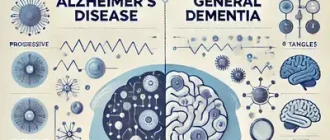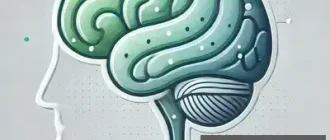Dementia is a complex and often misunderstood condition. It isn’t a single disease but a group of symptoms that affect memory, thinking, and social abilities severely enough to interfere with daily life. Early detection is key to managing the condition effectively.
Public Awareness of Dementia Risk Factors
| Risk Factor | Awareness Level (%) |
|---|---|
| Age | 85% |
| Family History | 70% |
| Lifestyle Choices | 60% |
| Head Injuries | 50% |
| Cardiovascular Health | 40% |
This chart highlights public awareness levels of dementia risk factors, emphasizing the need for more education on areas like cardiovascular health (40%) and head injuries (50%).
What Is Dementia?
Dementia refers to a decline in cognitive functions such as memory, language, and problem-solving skills. Common types include:
- Alzheimer’s Disease: The most prevalent form, accounting for 60–70% of cases. For example, someone with Alzheimer’s might repeatedly ask the same question despite having just received an answer, or forget the names of close family members.
- Vascular Dementia: Often caused by strokes or other issues with blood flow to the brain. A person might experience sudden confusion or difficulty concentrating after a minor stroke.
- Lewy Body Dementia: Associated with abnormal protein deposits in the brain. Individuals may report vivid hallucinations, such as seeing animals or people that aren’t there, or experience severe sleep disturbances.
- Frontotemporal Dementia: Involves degeneration of the frontal and temporal lobes of the brain. This could manifest as inappropriate social behavior, such as making rude comments, or a complete loss of empathy towards others.
Early Warning Signs
Recognizing the early signs of dementia can make a significant difference. Common symptoms include:
Memory Loss
Forgetting recently learned information or important dates is a hallmark sign. For instance, a person might struggle to recall a dinner date they scheduled just an hour earlier. According to Dr. Susan Whitbourne, a clinical psychologist, these lapses often disrupt daily tasks, unlike normal forgetfulness.
Difficulty Performing Familiar Tasks
Struggling with daily activities like cooking or managing finances. For example, a person may begin a recipe they’ve prepared for years but forget essential steps midway. Neurologist Dr. Andrew Budson notes that this indicates a breakdown in procedural memory.
Language Problems
Trouble finding the right words or following conversations. For instance, someone might repeatedly call a “refrigerator” a “cold box” or abandon sentences halfway. Dr. Sharon Cohen, a dementia researcher, highlights that such issues often occur early in Alzheimer’s.
Disorientation
Getting lost in familiar places or losing track of time. For example, a person might drive to the grocery store but forget the way back home. Dr. Richard Isaacson explains that disorientation in dementia is often due to hippocampal damage.
Mood and Personality Changes
Increased confusion, depression, or withdrawal from social activities. For instance, a previously outgoing individual may become irritable or avoid family gatherings. Dr. Peter Rabins, co-author of “The 36-Hour Day,” emphasizes that personality changes are among the most distressing symptoms for caregivers.
How Is Dementia Diagnosed?
1. Medical History
A detailed history helps identify risk factors, such as:
- Family history of dementia, which could suggest a genetic predisposition.
- Past strokes or brain injuries, which often contribute to vascular dementia or exacerbate cognitive decline.
For instance, a person with multiple minor strokes might recall having brief episodes of confusion or difficulty speaking prior to more noticeable cognitive changes. Neurologists emphasize that early documentation of such events can aid in accurate diagnosis.
2. Cognitive and Neuropsychological Tests
These evaluate:
- Memory, often through recall tasks like remembering lists or sequences.
- Problem-solving skills, which may involve puzzles or logic-based questions.
- Language, assessed through naming objects or defining words.
For example, during a neuropsychological test, a patient might struggle to name common objects like a clock or a chair, which signals language impairment linked to dementia. Dr. Angela Troyer, a cognitive specialist, notes that these tests are critical in differentiating dementia from normal aging.
3. Brain Imaging
- MRI and CT scans: Reveal structural changes in the brain, such as atrophy or shrinkage in key areas like the hippocampus.
- PET scans: Identify abnormal protein deposits linked to Alzheimer’s, such as beta-amyloid plaques.
A patient undergoing a PET scan might receive feedback indicating areas of reduced activity in the frontal or temporal lobes, often linked to specific dementia types. Specialists often use these results in combination with other findings to guide treatment plans.
4. Blood Tests
Rule out other conditions like vitamin deficiencies or thyroid disorders. For instance, low levels of vitamin B12 can mimic dementia symptoms but are treatable with supplements. Similarly, thyroid dysfunctions may cause memory issues that improve with medical intervention. Specialists like Dr. Jane Callahan stress the importance of comprehensive blood work to exclude reversible causes of cognitive decline.
Barriers to Early Dementia Diagnosis
This horizontal bar chart showcases common barriers to early dementia diagnosis, with lack of awareness (80%) and stigma (70%) being the most significant challenges. Addressing these barriers can lead to earlier interventions and better outcomes.
What Should You Do If You Suspect Dementia?
If you notice symptoms, consult a doctor promptly. Early diagnosis can help:
- Access treatments that may slow progression and provide symptom relief.
- Plan for the future, including financial and caregiving arrangements.
- Find support services, such as counseling and community programs.
Lifestyle Adjustments
Simple changes can improve quality of life:
- Engage in mental activities (e.g., puzzles, reading, or learning new skills) to stimulate cognitive function.
- Maintain a healthy diet rich in vegetables, fruits, and omega-3 fatty acids to support brain health.
- Stay socially active by joining local groups, scheduling regular calls with loved ones, or participating in hobby clubs.
- Establish a consistent daily routine to reduce confusion and provide a sense of stability.
- Use memory aids like calendars, labeled storage, or smartphone reminders to manage tasks more effectively.
Impact of Lifestyle Changes on Slowing Dementia Progression
| Lifestyle Change | Impact Level (%) |
|---|---|
| Regular Exercise | 90% |
| Balanced Diet | 85% |
| Mental Stimulation | 75% |
| Social Engagement | 65% |
| Consistent Sleep | 50% |
This chart illustrates the impact of lifestyle changes on slowing dementia progression. Regular exercise (90%) and a balanced diet (85%) show the highest benefits, while consistent sleep (50%) also contributes to overall cognitive health.
Dr. Helen Crawford, a geriatric specialist, highlights that small, consistent efforts in daily habits can significantly slow cognitive decline and enhance overall well-being.
Dementia vs. Normal Aging
It’s normal to forget small details occasionally. However, significant memory loss that disrupts daily life is not typical. Some key distinctions:
| Normal Aging | Dementia |
|---|---|
| Misplacing keys | Forgetting their purpose |
| Forgetting appointments | Not remembering them at all |
| Slower problem-solving | Unable to solve problems |
When to Seek Help
You should consult a healthcare provider if you or a loved one experiences:
- Progressive memory loss. For instance, a person might consistently forget recent conversations or appointments despite reminders. This type of memory issue is more than just misplacing keys; it involves repeated patterns that affect everyday life.
- Difficulty completing routine tasks. For example, an individual may start preparing breakfast but forget how to operate the toaster or coffee maker. This can also extend to workplace tasks, such as struggling to complete familiar processes that were once second nature.
- Behavioral changes that persist. These could include uncharacteristic irritability, sudden bursts of anger, or withdrawing from friends and family. For instance, a previously sociable person might decline invitations or stop participating in their favorite activities without explanation. Dr. Michael Smith, a neurologist, notes that these changes often signal underlying cognitive struggles.
Editorial Advice
Understanding dementia is the first step in addressing it. Early detection and proactive measures can significantly improve outcomes. If you’re worried about symptoms, don’t delay seeking medical advice. Take control of your health and seek support from trusted professionals.
Success Rates of Cognitive Therapy Approaches
| Therapy Approach | Success Rate (%) |
|---|---|
| Memory Training | 88% |
| Cognitive Behavioral Therapy (CBT) | 82% |
| Group Therapy | 75% |
| Virtual Reality Exercises | 68% |
| Brain Games | 60% |
This chart demonstrates the success rates of various cognitive therapy approaches, with memory training (88%) and cognitive behavioral therapy (82%) leading as the most effective methods, while brain games (60%) show moderate benefits.
About the Author
Reyus Mammadli is the author of this health blog since 2008. With a background in medical and biotechnical devices, he has over 15 years of experience working with medical literature and expert guidelines from WHO, CDC, Mayo Clinic, and others. His goal is to present clear, accurate health information for everyday readers — not as a substitute for medical advice.







